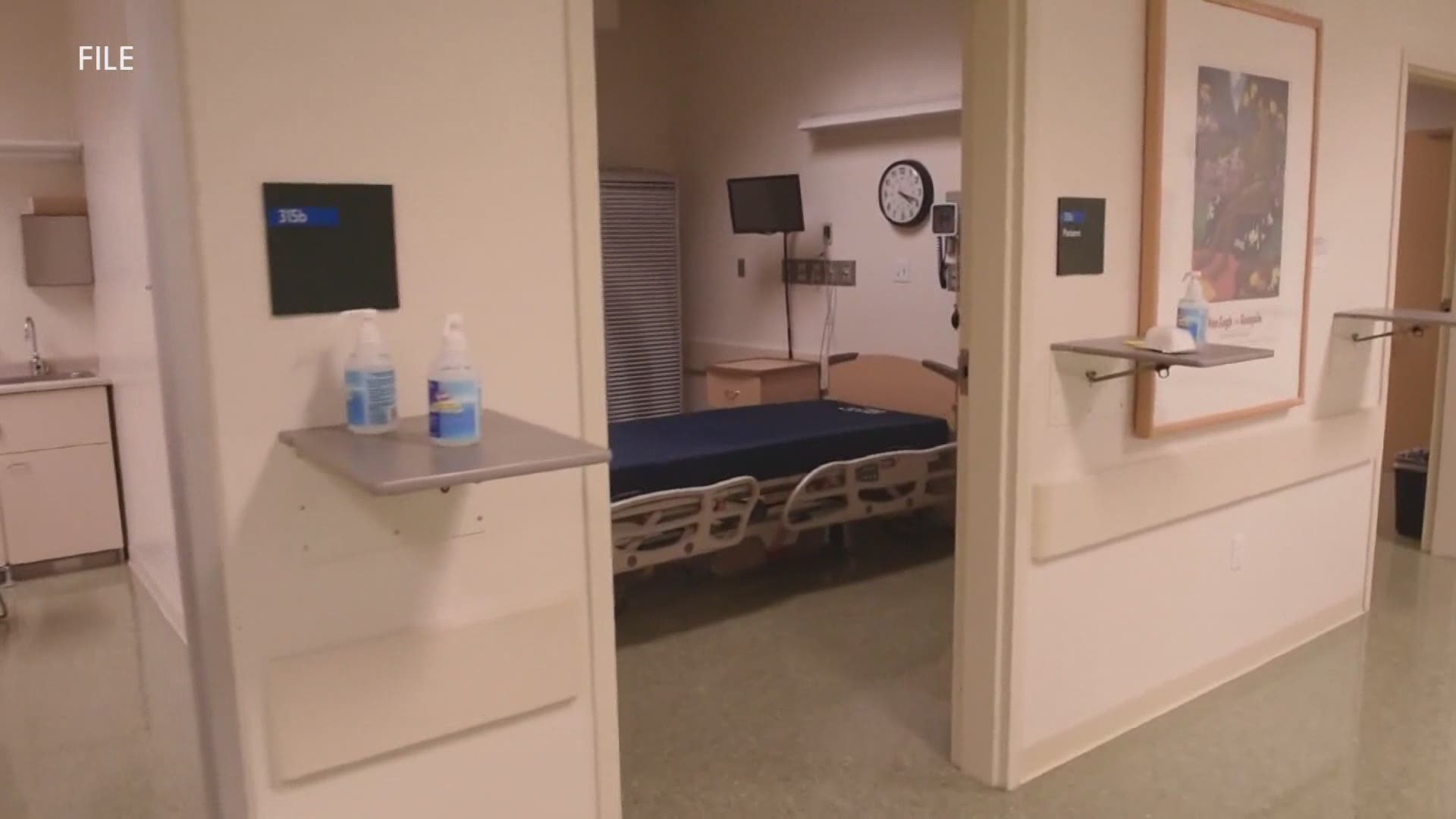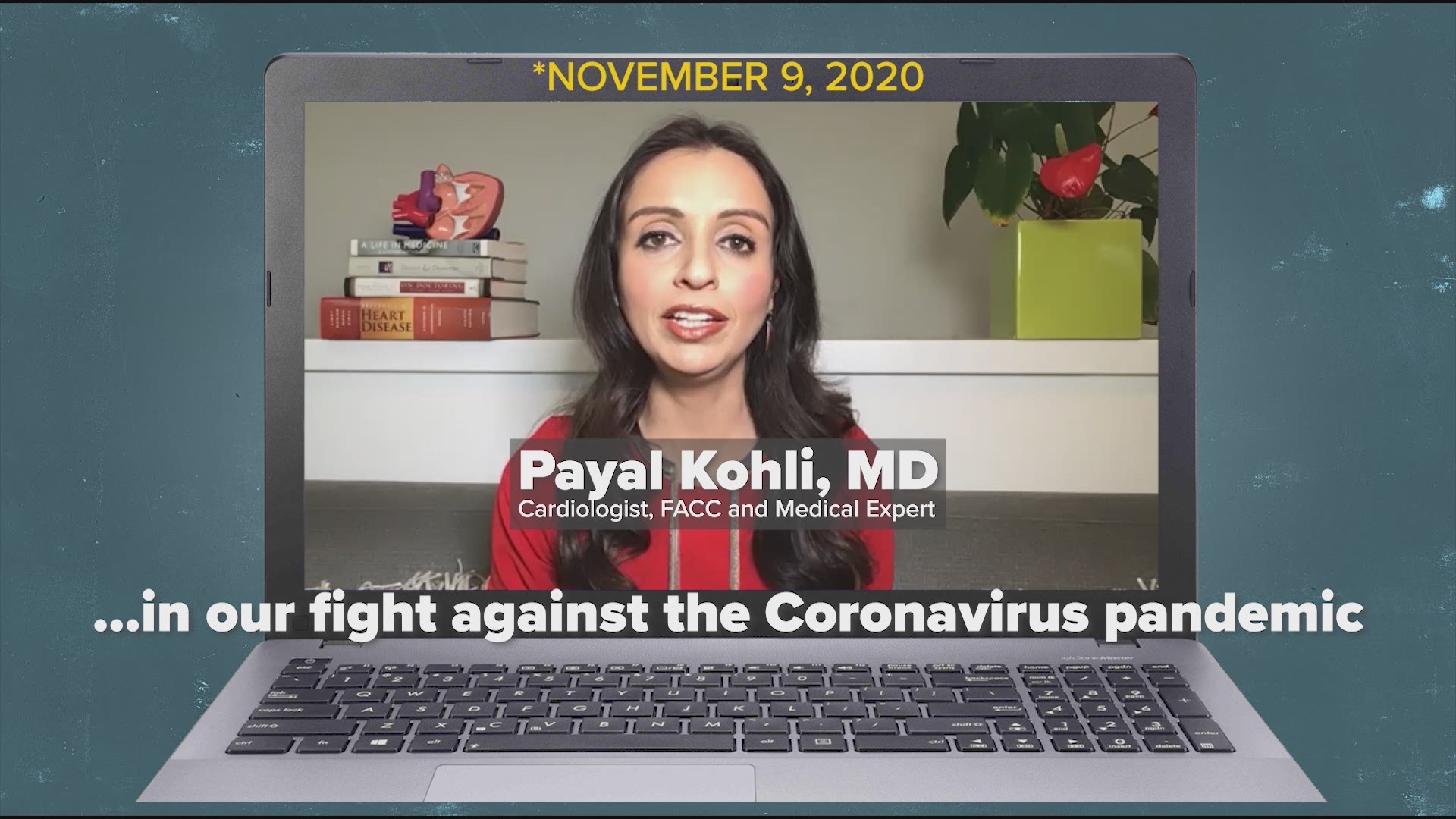GRAND RAPIDS, Mich. — COVID-19 cases are on the rise in Michigan, as well as positivity rates and hospitalizations. Spectrum Health held a press briefing Wednesday afternoon to discuss the rapid rise in positivity rates in West Michigan and what the community can do to flatten the curve.
POSITIVITY RATES AND COMMUNITY SPREAD
The rapid rise in the positivity rates started just a few weeks ago, said Darryl Elmouchi, MD, MBA, president of Spectrum Health West Michigan.
Spectrum does upward of 4,000 COVID-19 tests per day and is up to a positivity rate of about 14% right now. It has hit as high as 20% — it varies day by day, Elmouchi explained. Eight days to two weeks after increased positivity, Elmouchi said the hospital network starts seeing an increase in hospitalizations.
Spectrum officials are talking with the state health department, other hospitals, and community partners to pinpoint where the spread seems to be occurring.
"The spread seems to be occurring in the community, not necessarily in schools and businesses were the precautions are in place," said Tina Freese Decker, president & chief executive officer of Spectrum Health, during the briefing. "That's the difference from what it was like in the spring."
"Gatherings, even small ones, are a key reason for the spread of COVID-19 that's coming forward and Spectrum leadership is particularly concerned with the holidays coming up," Freese Decker went on to say.
Just recently, the Center for Disease Control and Prevention issued some health and safety steps to take while celebrating Thanksgiving amid the pandemic. Health officials recommend celebrating virtually, or only with family members within the same household, which poses only a low risk of spreading the virus.
"What we want to do is flatten the curve and get through this time period, knowing that the positivity rate will eventually come down," Freese Decker said. "Evaluate whether it's worth the risk and how you can help to contribute to the community in driving the positivity rate down and maybe delay social gatherings you've been looking forward to for a few more weeks so that we can get the positivity rate down and flatten the curve."
"Ultimately, we're not talking about months and months of not leaving our home, the goal would be that everyone would do their part for a few weeks and then this starts coming down, then hopefully we can start doing a bit more in the coming weeks," Elmouchi added. "This is very serious, we have been in contact with every single hospital in the region and everyone is feeling it the same way. We're getting tot he point where if we don't have the public helping us, we're going to see a lot more patients in the hospital and a lot more patients die. It will not be a pleasant sight and I'm hopeful that everyone will heed this warning."
►Watch the full briefing here.
VISTOR RESTRICTIONS & DOCTOR VISITS
Spectrum leadership said its taking many steps to protect patients, including enhancing visitor restrictions starting Thursday, Nov. 12 at inpatient hospitals in West Michigan.
Adult inpatients coming to emergency departments and hospitals will not be permitted to have visitors, with exceptions to end-of-life care and hospice. This is to protect patients, visitors and staff, hospital leadership explained during the briefing.
Spectrum no longer has concerns about PPE supplies and will continue to keep out patient services and surgeries for now.
TESTING
Spectrum does upwards of 4,000 tests per day. They are seeing an increase in demand, as well as an increase in symptomatic individuals in the community, according to hospital leadership.
Starting Wednesday, Nov. 11, Spectrum will be prioritizing testing to individuals who show signs and symptoms of COVID-19 and will not perform tests to individuals solely based on exposure.
The rationale behind the testing limitations was, in part, symptomatic patients need to be tested and that Spectrum wants to keep the testing turnaround time short, Elmouchi explained.
COVID-19 VACCINE PREPARATIONS
Earlier this week, Pfizer Inc. said that it's COVID-19 vaccine may be 90% effective. And although the announcement doesn't mean a vaccine is imminent, Spectrum has been making necessary preparations — everything from buying freezers to working with local partners and health departments — to prepare for distribution. Elmouchi said hospital leadership is hopeful that in the coming months Spectrum will be able to participate in distributing the vaccines as they become available.
"We also want to remind everyone that even though a vaccine is on the horizon, it's not here yet, it's not a cure today, it's not going to stop what we're seeing. And we're really emphasizing that everyone needs to do their part," Elmouchi pressed in the briefing.
CAPACITY LIMITS AND EXPANDING
Elmouchi said Spectrum is close to traditional capacity, but explained that other floors have been converted to COVID-19 units and some rooms have been converted to ICU rooms.
Earlier this week, Spectrum was reportedly at 75% capacity — which includes all the hospitals in their system.
"As we've learned from hospitals in Detroit and New York early in the pandemic, you can absolutely expand capacity if you truly need this," Elmouchi said.
Spectrum looks at bed and staffing capacities, they also take into account length of stay and whether patients can be discharged to their homes or another setting — all of that factors into their modeling that projects their capacity trajectory. They are taking proactive measures to ensure that they have the room for more patients as it is necessary.
Elmouchi also said hospital leadership is in active discussion with local and state officials on the possibility of alternative care sites, but similarly to what was seen in Detroit and New York, those are very rarely used.
The biggest limitation in using in alternative care site, something that hospital networks across the country are seeing, is staffing. "Even if we had another site with hundreds of beds available, staffing would absolutely be an issue, if we got to that point," Elmouchi said.
►View the Spectrum Health COVID-19 Dashboard here.
RELATED VIDEO:
►Make it easy to keep up to date with more stories like this. Download the 13 ON YOUR SIDE app now.
Have a news tip? Email news@13onyourside.com, visit our Facebook page or Twitter. Subscribe to our YouTube channel.


